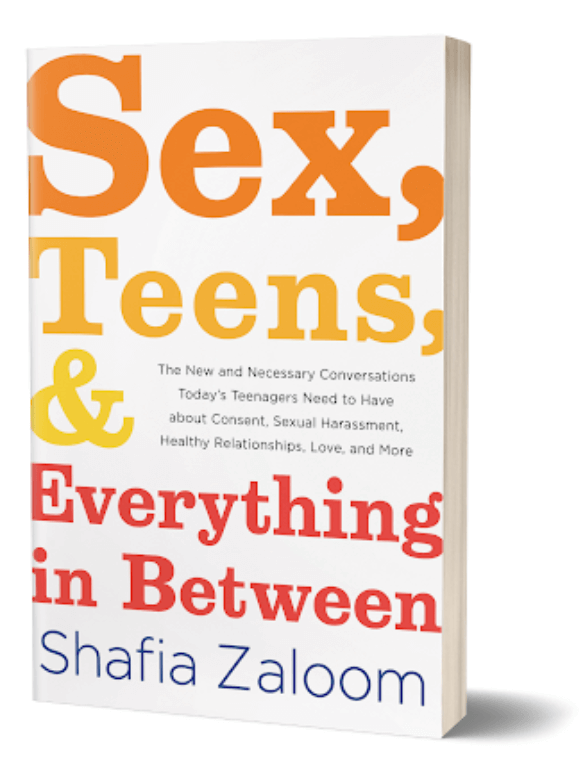Adolescent Sexual Relationships: The Importance of Consent

The Scenario
Kai is at a small party at a friend’s house. There is drinking. Some of the teenagers, including Jordan, who Kai has a crush on, are smoking weed as well. Last week, Kai’s friend, Maria, told Jordan that Kai is interested in something “more than friends” and the feeling seems to be mutual.
Kai and Jordan talk, laugh, and hang out. Pretty soon the rest of their friends move on to the kitchen to find something to eat. Kai and Jordan are alone in the TV room and Jordan makes a move. They kiss and make out for a while. It feels great for both of them. Jordan’s hands start to explore Kai’s body and then to the button on Kai’s jeans. Kai starts to feel a little awkward, and moves so that Jordan can’t undo the jeans. Jordan moves Kai’s body back to how it was and whispers, “Don’t worry, we’ll take it easy.”
The Context
Many American teenagers are steeped in a culture that glamorizes sexual aggression and hooking up without emotional connection. It’s tough to make good choices in an atmosphere that normalizes porn, conducts personal relations on impersonal screens, and hyper-sexualizes every aspect of popular culture. Our kids are bombarded with messages about sex and relationships online and from Snapchat and Instagram, as well as from their friends, movies, songs, ads, video games, and T.V.
If we’re not talking to our kids about sex, we’re the only ones not talking to our kids about sex. As parents, we are the primary sexuality educator in our children’s lives, and have to be a part of that conversation. And teens have to be able to ask hard questions about how to take care of themselves, make decisions that reflect their values, and stay safe.
A Difficult Conversation
Those conversations are often difficult, even for me as a health educator — and I’ve been talking to teens about sex for twenty-five years. I specialize in creating safe educational environments in which teens can speak openly about touchy, messy issues involving friends, relationships, drugs, alcohol, and sex. They ask honest questions like:
“How do I get this guy to delete naked pictures he has of me on his phone?”
“I’m not ready to have sex yet but all of my friends talk about it, so should I just get it over with so I can be included in the conversation?”
And from parents:
“When I tried talking to my kid about sex, she just put her hands over her ears and yelled ‘Stop! We don’t need to talk about this. I’ll just learn it in school!’ So can I just let it go?”
“My 17 year old son has a partner and wants to have them spend the night. Is it better for them to be together, safe in my house, or to say ‘no’ and have them go mess around in a car or the park or something?”
How to Start
Focus on Values
There are many components to healthy sexuality: gender, sexual orientation, sexual reproductive anatomy, consent, safe sexuality practices, effective communication, responsibility, pleasure and dignity, to name a few. As parents, it’s important that we address as many of these aspects as we can over the span of our relationship with our children. I always encourage parents to collect moments vs. go for a “big talk.” Think scaffolding and layers vs. gigantic downloads.
Values are the largest aspect of sex education and the part that only you can teach. One valuable aspect that has been in the media spotlight for young people is consent. California requires schools to provide “pupils with the knowledge and skills necessary to have healthy, positive, and safe relationships and behaviors. Consent is fundamental to healthy sexuality at any age.
The Information: Consent
The legal age of consent for sexual intercourse in California is 18. The average age of first intercourse is about 17.
In California, many school districts include health education as a graduation requirement. Those that do must include instruction on California’s affirmative consent standard. Consent is an agreement between people who are of the same mind — both understand what's proposed and accept whatever is agreed upon. It protects people and keeps them emotionally and physically safe. In a consensual relationship (two people relating to each other in some way) both people communicate about how they want to be treated and listen for how the other person wants to be treated.
Both people pay attention to the other's wants and needs, and work together to treat each other with dignity (like they have self-worth or value). There is mutual respect. Respect is treating someone how they want to be treated. This contributes to the context (what's going on with someone internally and what's going on in the external environment they're in) of consent in a moment.
|
Definitions of Sexual Assault and Affirmative Consent |
|
|---|---|
|
Sexual Assault: Any unwanted sexual contact or sexual activity, whether through force, emotional manipulation, or coercion. |
Consent: Affirmative, continuous, conscious, and voluntary agreement to engage in sexual activity. |
Definitions from the 2019 draft of the California Health Framework Chapter 6: Grades Nine Through Twelve (Note: DOCX file download required).
In a sexual relationship (whether it's established or a hook up) sometimes people will talk about what they want to do sexually before it actually happens. This is a good thing as long as the context is consensual (wanted and welcome) and even better if it's in person. It's an opportunity to express desires and limits. However, people have the right to change their minds, and sometimes the context of sexual activity in a moment ends up feeling different or isn't what someone expected.
There are lots of variables that make up the context of a sexual situation and they may shift and change while sexual activity is happening. That's why consent needs to be acquired in the moment and be ongoing. It can also be revoked at any time. Consent cannot be given while someone is incapacitated (drunk) by drugs, including alcohol. Every time someone initiates a new level of intimacy, the person who initiates the move needs to acquire the other person's consent. They can pause in the moment and say, "this okay?" or "you good?" or "how would you feel about taking this off?"
If the person says yes, it is okay to continue; however, if the person being asked seems hesitant in any way (even if they say 'yes'), is drunk, or not responding to your touch in affirmative ways (like moving towards you, making pleasurable noises etc) then stop what you are doing and ask what's up.
If you are the person being asked for consent and you want to give it, be clear that you want to continue. If you are unsure, say so, and if you want, suggest something else; if you don't want to, you can say 'no' or 'let's just stay like this' or express what you'd like to do instead and figure out what you do want. If you say 'yes' to something and it starts to be uncomfortable or you don't want it anymore, you can revoke consent, or say something like, "this doesn't feel right, let's stop." The person you are with should stop.
Communicate
Sexual communication is normal, natural and important when people are exploring each other's bodies and sexuality. If something feels awkward (because real-life sexual activity gets awkward sometimes) simply acknowledge it, laugh about it (not at the expense of your partner, of course), and move through it.
Consent is what makes sexual activity legal and is most important because it protects the fundamentals of human dignity. Note that the legal age of consent for sexual intercourse varies from state to state. In California it is 18. You can find more information on California’s penal code provisions on consent here. Remember though, consent doesn't make the sexual activity ethical (taking into account the well being of the people involved) or 'good' (pleasurable and satisfying for both people). Ethical and 'good' sexual activity requires healthy sexual communication and context. That's ultimately the healthy sexual exploration to aspire to because everybody deserves it to be good — it should be good!
Practice communicating
Like all aspects of learning, there is the information, and then how to apply that information within the context of an interpersonal dynamic or to the complexities of human relationships.
Talking about scenarios like the one above can help teens and parents think things through and get used to open communication. You can find more scenarios and discussion guidance in my book Sex, Teens & Everything in Between.
 Shafia Zaloom is a health educator and consultant whose work centers on human development, community building, ethics, and social justice. In her 25-year career, Shafia has worked with thousands of children and their families in her role as teacher, coach, administrator, board member, and outdoor educator. Shafia is currently the health teacher at the Urban School in San Francisco, and develops curricula and trainings for schools across the country. She was honored by the San Francisco Giants Foundation in 2018 for her work with Aim High, a program that expands opportunities for students from low-income neighborhoods and their teachers through tuition-free summer learning enrichment. Her work has been featured in The New York Times, USA Today, NPR, and PBS. She lives in California with her husband and three children.
Shafia Zaloom is a health educator and consultant whose work centers on human development, community building, ethics, and social justice. In her 25-year career, Shafia has worked with thousands of children and their families in her role as teacher, coach, administrator, board member, and outdoor educator. Shafia is currently the health teacher at the Urban School in San Francisco, and develops curricula and trainings for schools across the country. She was honored by the San Francisco Giants Foundation in 2018 for her work with Aim High, a program that expands opportunities for students from low-income neighborhoods and their teachers through tuition-free summer learning enrichment. Her work has been featured in The New York Times, USA Today, NPR, and PBS. She lives in California with her husband and three children.Tags on this post
Health Sex EdAll Tags
A-G requirements Absences Accountability Accreditation Achievement gap Administrators After school Algebra API Arts Assessment At-risk students Attendance Beacon links Bilingual education Bonds Brain Brown Act Budgets Bullying Burbank Business Career Carol Dweck Categorical funds Catholic schools Certification CHAMP Change Character Education Chart Charter schools Civics Class size CMOs Collective bargaining College Common core Community schools Contest Continuous Improvement Cost of education Counselors Creativity Crossword CSBA CTA Dashboard Data Dialogue District boundaries Districts Diversity Drawing DREAM Act Dyslexia EACH Early childhood Economic growth EdPrezi EdSource EdTech Education foundations Effort Election English learners Equity ESSA Ethnic studies Ethnic studies Evaluation rubric Expanded Learning Facilities Fake News Federal Federal policy Funding Gifted Graduation rates Grit Health Help Wanted History Home schools Homeless students Homework Hours of opportunity Humanities Independence Day Indignation Infrastructure Initiatives International Jargon Khan Academy Kindergarten LCAP LCFF Leaderboard Leadership Learning Litigation Lobbyists Local control Local funding Local governance Lottery Magnet schools Map Math Media Mental Health Mindfulness Mindset Myth Myths NAEP National comparisons NCLB Nutrition Pandemic Parcel taxes Parent Engagement Parent Leader Guide Parents peanut butter Pedagogy Pensions personalized Philanthropy PISA Planning Policy Politics population Poverty Preschool Prezi Private schools Prize Project-based learning Prop 13 Prop 98 Property taxes PTA Purpose of education puzzle Quality Race Rating Schools Reading Recruiting teachers Reform Religious education Religious schools Research Retaining teachers Rigor School board School choice School Climate School Closures Science Serrano vs Priest Sex Ed Site Map Sleep Social-emotional learning Song Special ed Spending SPSA Standards Strike STRS Student motivation Student voice Success Suicide Summer Superintendent Suspensions Talent Teacher pay Teacher shortage Teachers Technology Technology in education Template Test scores Tests Time in school Time on task Trump Undocumented Unions Universal education Vaccination Values Vaping Video Volunteering Volunteers Vote Vouchers Winners Year in ReviewSharing is caring!
Password Reset
Search all lesson and blog content here.
Login with Email
We will send your Login Link to your email
address. Click on the link and you will be
logged into Ed100. No more passwords to
remember!
















Questions & Comments
To comment or reply, please sign in .